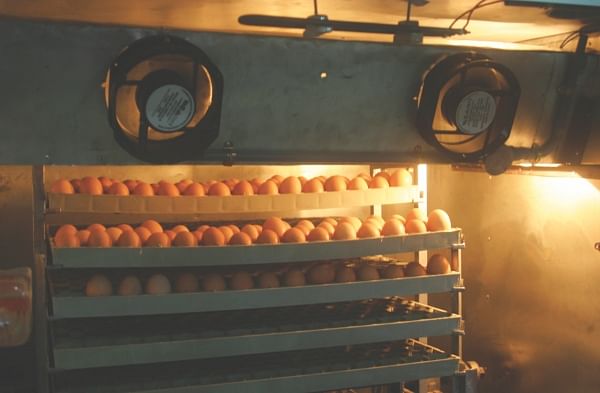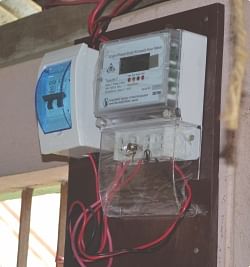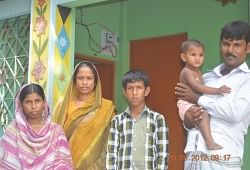| Home - Back Issues - The Team - Contact Us |
 |
| Volume 11 |Issue 38| September 28, 2012 | |
|
|
Endeavour
Shiny Prospects of Solar Energy Morshed ali Khan The people of Durgapur village, under the Joymontok union of Shingair Upazila in Manikganj, an hour's drive from Dhaka, have virtually remained cut off from the rest of the country. Till today, the village has no electricity, road or access to any modern-day facility although agricultural output of Durgapur is enviable. The area produces one of the best quality carrots in the country and every household boasts of livestock ranging from huge sacrificial bulls to free range chickens, ducks, goats and milking cows. For Abdus Salam and all other farmers, agriculture brings hard cash and solvency. Most of the farmers now can afford to buy television, refrigerator and other modern gadgets. But the problem of having no electricity has always been a cause of frustration. But things may change for this unheard of village.
Initiative to stand by the villagers came from none other than a team of Bangladeshi born Canadians trying to introduce clean energy in a country where half of the population remains out of the purview of electricity. No one could be happier than Salam as the team leader and the managing director of Bangladesh Clean Technology Company Ltd. (BCTC), Sufi Iqbal Ahmed, approached him a year ago to set up a five-kilowatt mini-grid solar power station, Salam quickly grabbed the idea. He rented out his land for the pilot project next to his house where the company set up the first solar powered mini grid. Ever since, ten households, including that of Salam's, have been connected to uninterrupted supply of electricity day and night. Salam now has ceiling fans, a TV and a refrigerator in his house.
Salam's brother in the neighbourhood, Mohammad Monaf says the entire family is happy with the uninterrupted electricity. “Our families are learning to economise on the use of electricity,” Monaf, who pays around Tk 250 a month, as per a digital meter mounted outside his house, said. Monaf's idea to economise on the use of the solar power comes because at Tk 25 per kilowatt it is three times more expensive than electricity from the national grid. The simple question is that with the price of solar panels decreasing sharply, the installation costs of a grid should also be much less and once installed, the grid can be run for years with insignificant maintenance costs. Sufi Iqbal says that it would be a wrong to compare solar energy with power from the national grid. “One of our main objectives is to grow awareness among people on energy conservation,” says Sufi justifying the tariff, “Then running a grid for uninterrupted power supply day and night could be quite expensive because it involves batteries, which are still very expensive with a maximum lifespan of five years.” “Every household will be provided with the most energy saving LED bulbs, fans and fridges to cut down electricity costs drastically,” he continues." In fact at the end of the day a villager would be paying less than what he might have paid with other sources”. The team's future plans with the project are promising. Sufi Iqbal says that once the company gets financial support from Infrastructure Development Company Ltd. (IDCOL), a non-bank financial institution, they first intend to connect 1200 households for which a survey has been completed and a piece of land earmarked.
Dr Rizwan Khan, an electrical engineer and also the Vice Chancellor of the United International University, oversees the design aspects of BCTC project components. He says that they are now designing a solar powered cold storage for the villagers to safely store their agricultural produces. Although the idea of solar powered cold storage could revolutionise the agricultural scenario for the filed level farmers, but it is a hugely challenging job for the designers. “You have to find the most cost effective and technically viable ways to design the cold storage at this level,” says Dr Khan. “At this level you have to target small farmers who can, for instance, store their produces like tomatoes, chilli, carrot, beans and other vegetables for a shorter period of time,” Dr Khan adds. Sufi Iqbal displays an incubator under the roof of the mini grid station and says that the locally made solar powered incubator could hatch 2,000 chicks at a time in slightly over three weeks. “Women who rear poultry in their houses could bring in eggs here for hassle free incubation,” he says. “In this way a villager may also own a solar powered incubator to start a business,” added Sufi. Probably the most innovative thing Sufi and his team members' have come up with is the 1.5 horse power solar device that is capable of pumping out 3 lakh litres of water from a shallow depth every day and provide power to ten households. “The cost to install the device is around Tk 4 lakh", says Sufi Iqbal. "But once a farmer is able to install one, he is guaranteed a hassle free irrigation for his fields and power for ten households in his neighbourhood for up to 20 years.” “The farmer no longer has to worry about buying diesel for his irrigational pump,” he adds. The expatriates' team wants to expand the project to remote areas of Rangpur and char areas of the country which the Rural Electrification Board has, in principal, excluded from its expansion programme. |
||||||||
Copyright
(R) thedailystar.net 2012 |


